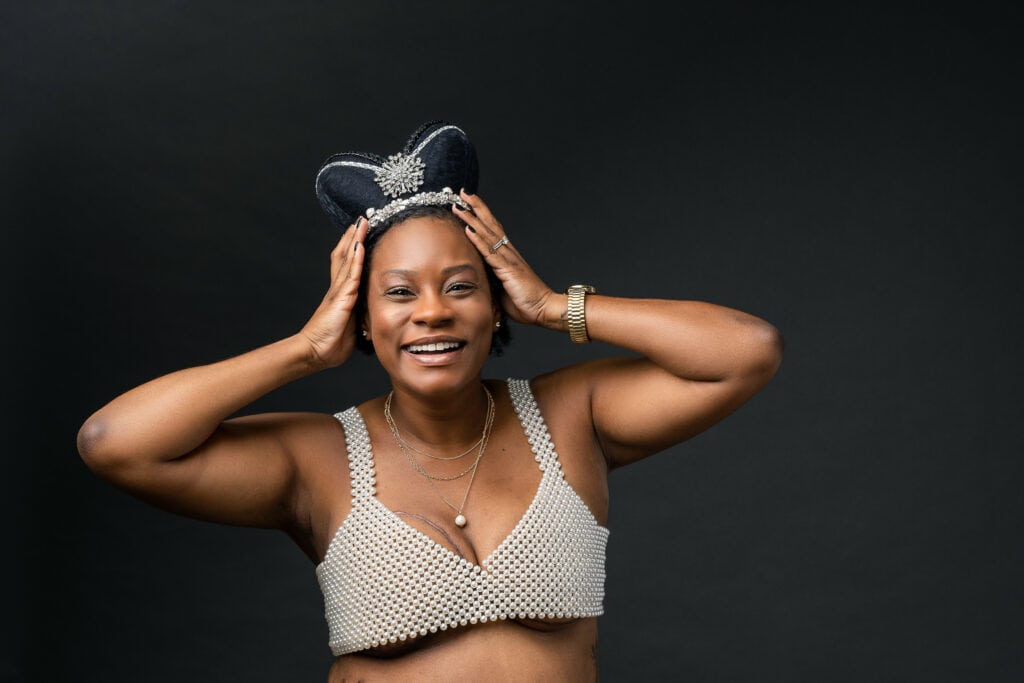
Lauren Tarpley was diagnosed with stage 2 HER2+, hormone receptor-negative and BRCA-negative invasive ductal carcinoma in 2020.
Lauren was 34 years old, married, the mother of a 1-year-old. Breast cancer wasn’t something that had crossed her mind. She does have a history of breast cancer in her family and had been undergoing annual mammograms since she turned 30, but breast cancer wasn’t on her radar.
At an OBGYN appointment, Lauren mentioned a nagging pain in her armpit. Her doctor was out, so she saw another doctor. He told her it was an ingrown hair, and advised her to come back in a couple of weeks or months.
Shortly after this exchange, Lauren called to schedule her mammogram. A week later, she got a call with the results: the mammogram showed asymmetry and calcifications, atypical for someone her age. But the person on the other end of the line didn’t seem concerned, so Lauren didn’t call back to arrange a follow up. “There was no sense of urgency, so I wasn’t concerned about it,” Lauren said.
The next day, her OB called. She’d been going through Lauren’s notes and wanted to know if she had any questions. “I talked to her about my armpit pain, and I also brought up my mammogram,” Lauren said. “I told her what they said on the call, and that I didn’t think I was going to go to my follow up, but my doctor said, ‘I don’t like the way that sounds. Please go to the follow up.”
Lauren scheduled the follow up test, a breast ultrasound. She remembers how quiet the tech was – nice, but quiet. There was something concerning on the scan. A week later, Lauren went in for a biopsy. And a day after that, Lauren learned she had breast cancer.
“I was at home when I got the call, in my last meeting of the day,” she recalled. “We were going into Labor Day weekend. My son was at his grandparents’ house. I had a half day of work and was wrapping up, we had football, we had the Kentucky Derby. It was going to be such a great weekend. That is what was on my mind.”
“I did not have a lump. I did not have discharge from my nipple. The only symptom of breast cancer was pain in my armpit,” Lauren said. “I also had increased blood pressure and I had weight gain, but we were six months into the pandemic. I was breastfeeding and considered postpartum. In a vacuum, these things didn’t mean anything. Together, they were all red flags.”
Lauren found an oncologist. She underwent an MRI and PET scan. The cancer was in her lymph nodes. She underwent six rounds of chemotherapy, 11 rounds of immunotherapy, 25 rounds of radiation therapy and a double mastectomy. Initially, treatment was supposed to be a year. But it stretched on and she had several complications.
After her mastectomy, Lauren had reconstruction but developed staph (an infection), which precluded her from implants. She then had a latissimus dorsi flap to replace radiated skin to build a breast, but the flap didn’t take. She ended up having a DIEP flap, but then contracted MRSA (an infection) and had to go back to surgery. “I’ve had nine reconstructive surgeries, and I’ve had 11 surgeries total over 18 months,” she said. “It has not been a straightforward line. That weighs heavily on the mental toll of survivorship and moving on.”
For two years, Lauren was in survival mode. Only recently does she feel like cancer is no longer a daily or weekly thought. She and her husband are expecting their second child, a little girl. She’s focused on a move. “You have to take the power from the timeline of when you’re supposed to be fine, when you’re supposed to be normal, when you’re going ‘back’ to who you were,” she said. “There is no ‘back.’ I think if you let go of that disappointment of trying to get that person back, if you grieve and let those things go, I think you will get on your path to survivorship quicker and more steadily.”
Click here to learn more about breast cancer risk.
Statements and opinions expressed are that of the individual and do not express the views or opinions of Susan G. Komen. This information is being provided for educational purposes only and is not to be construed as medical advice. Persons with breast cancer should consult their healthcare provider with specific questions or concerns about their treatment.



